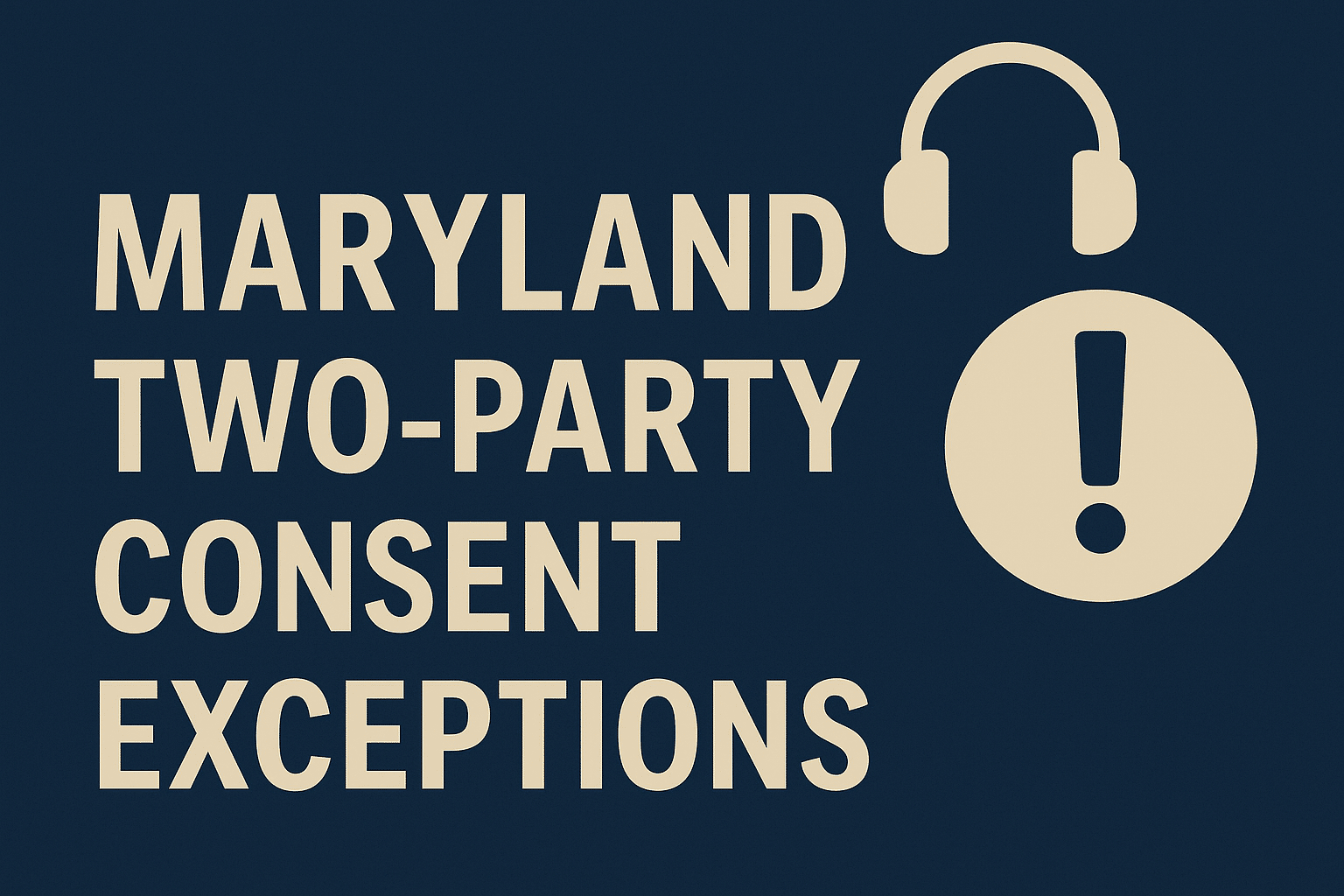
Under Maryland law, it’s illegal to “intercept” or record any oral, wire, or electronic communication unless all parties to the conversation consent. This includes phone calls, in-person discussions, and even some digital messages.
Violating the statute can lead to criminal charges and civil penalties, including potential jail time and fines. Illegally obtained recordings are also inadmissible in court, which can seriously affect a criminal case or civil dispute.
Exceptions to the Two-Party Consent Requirement
Although the general rule is strict, Maryland law recognizes a few key exceptions. These exceptions can determine when a recording is legal and when it’s not.
1. No Reasonable Expectation of Privacy
The law only protects “private conversations.” If the people being recorded have no reasonable expectation of privacy, consent is not required.
For example:
- A conversation shouted across a parking lot is not private.
- A discussion in a crowded restaurant where others can easily hear may also not be private.
- On the other hand, a quiet conversation in a home, office, or car usually is.
The key question is whether the person reasonably believed their words were not being overheard or recorded.
2. Video-Only Recordings
Maryland’s wiretap law applies primarily to audio recordings. If a video camera is recording without sound, that generally does not violate the two-party consent rule.
That said, other laws may still apply. Secretly recording video in private areas—like bathrooms, bedrooms, or changing rooms—is still illegal under Maryland’s separate voyeurism and surveillance laws.
3. Law Enforcement Exceptions
Law enforcement officers can record conversations without consent if they have a court order or warrant that authorizes it. These exceptions exist to allow legitimate investigations into criminal activity.
However, police officers must follow strict legal procedures before doing so. Unauthorized or unlawful recordings by law enforcement can still be challenged in court.
4. Interception Timing and Stored Messages
Maryland’s wiretap law applies when a communication is intercepted during transmission—for example, recording a live phone call without consent.
Accessing stored communications, such as reading old text messages or emails, may not count as an interception under this statute. Still, doing so without permission could violate other privacy or computer-related laws.
5. Implied Consent
In some cases, Maryland courts have recognized implied consent. This happens when a person knows or reasonably should know that a conversation is being recorded and continues speaking anyway.
For example, when a recorded phone line includes a message that says, “This call may be recorded,” anyone who stays on the line after hearing that message may be considered to have consented.
Even so, relying on implied consent can be risky—especially in sensitive or disputed situations. Whenever possible, it’s best to get clear, explicit consent before recording.
What Isn’t an Exception
Maryland residents should be careful not to assume that certain situations automatically make recording legal. Some common misconceptions include:
- Being part of the conversation does not give you automatic permission to record it.
- Recording for your own protection doesn’t excuse violating the statute.
- Sharing or publishing an illegal recording can lead to additional criminal charges.
If there’s any doubt about whether a recording is legal, assume it isn’t—or speak to a Maryland criminal lawyer before proceeding.
Best Practices for Recording in Maryland
- Always ask for explicit consent before recording a conversation.
- When in doubt, avoid capturing audio unless you have clear permission from everyone involved.
- Use written or verbal confirmation that consent has been given.
- Remember that federal law and other states may have different rules if your call or communication crosses state lines.
Talk to a Southern Maryland Criminal Lawyer
Maryland’s two-party consent law is serious, and violating it—even by accident—can have lasting legal consequences. If you’ve been charged with illegal recording or if a recording is being used as evidence against you, you need an experienced criminal defense attorney on your side.
At Southern Maryland Criminal Defense, we represent clients across Charles, Calvert, St. Mary’s, and Prince George’s Counties in cases involving privacy violations, electronic surveillance, and related charges. We’ll help you understand your rights, review the evidence, and build a strong defense.
Contact us today to schedule a confidential consultation and discuss your case with a Southern Maryland criminal lawyer.
